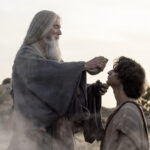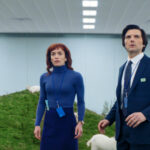Classical music and orchestral scores have long been the soundtrack to cinema’s most affecting moments. Unique in their ability to perfectly sync a layer of music to the emotion of the action unfolding on screen, films engage our ears and ears simultaneously—in ways that pack an emotional punch.
Wordless music in a film often speaks more to us than all the words of the script. Why? I think it’s because music in general is a language with mysterious communicative potential. Whether it be a cellist playing Bach or a brass quartet covering an old English folk song, instrumental music touches truth without uttering a word. When music really soars, it can feel like something heavenly reaching down from above. We get goosebumps and a lump in our throat. The harmonies and chords make us feel, however briefly, outside time and space. We feel brushes with transcendence.
That even secular audiences feel these moments to be grasping “transcendence” speaks to the way music bears witness to something science can’t explain, something that feels like a postcard from far away. As Bach famously put it, “I play the notes as they are written, but it is God who makes the music.” When I have gone to concerts of instrumental bands like Explosions in the Sky, it has felt like a church worship service in a secular age. That’s because the very existence and potential of music is an apologetic for God. “Music can be understood, along with everything beautiful in the world, as a faint reflection of the pre-temporal glory of God,” Gavin Ortlund writes. “It is a tiny echo of what was happening before time and space.”
Christians should embrace the common grace of music as a natural bridge to having conversations about God with our unbelieving friends and neighbors. There is something going on in music that draws hearts and souls beyond the immanent plane, upward to the God they may not even believe exists.
There is something going on in music that draws hearts and souls beyond the immanent plane, upward to the God they may not even believe exists.
The following 11 moments of instrumental music in movies capture this transcendent potential of music well. There are countless more scenes like this we could celebrate, to be sure, but these are some of my favorites.
2001: A Space Odyssey (1968), “Also sprach Zarathustra” (Richard Strauss)
Perhaps the best opening titles sequence in film history, Stanley Kubrick’s masterpiece opens with a slow rise of the sun above the Earth and Moon, to the corresponding sonic rise of Richard Strauss. At a time in history when space, science, and screens were beginning to replace religion as sources of awe and devotion, 2001’s opening perfectly captured the shift. Notice the thunderous organ at the end of the musical clip—a musical reference to sacred music, reframed here for the new “sacred space” of movies and sci-fi exploration (something Hans Zimmer also does in the organ-heavy soundtrack to Interstellar). The music declares from the outset the ambition of 2001 to be something both eye-popping and soul-stirring.
Arrival (2016), “On the Nature of Daylight” (Max Richter)
Max Richter’s haunting song bookends this movie, showing up in the anguished opening scene and the mind-bending, deeply affecting closing scene. When I watched Denis Villeneuve’s theologically inflected sci-fi film the first time, the song’s effect on me in the closing minutes of the film was profound. I wept uncontrollably. The pieces of the film’s labyrinth, non-linear plot now in place, the finale becomes an extended “Selah” moment of—at least for me—worship. Richter’s song played like a liturgy in my heart, as the kindness of God and his sovereignty amid suffering sunk in to deeper levels than I had ever felt while watching a film.
The Kid with a Bike (2012), “Piano Concerto No. 5” (Ludwig van Beethoven)
Perhaps the most sparingly used of any classical pieces on this list, the gorgeous adagio section of Beethoven’s “Emperor Concerto” shows up in a few brief moments (like, 10 seconds’ worth) in Jean-Pierre and Luc Dardenne’s stunning film. But the brief moments pack a punch, with the music functioning in the film as a sort of layer of divine presence that descends into the action of the film at pivotal moments—puncturing the cold despair with a stirring swell of hope.
Knowing (2009), “Symphony No. 7: Allegretto” (Ludwig van Beethoven)
If you watch one Nicholas Cage religious apocalypse movie, watch Knowing rather than Left Behind. Seriously though, Alex Proyas’s Knowing is underrated as a theological mindbender, and its ending is sublime and ridiculous in the best sense. Lars von Trier also set the end of the world to gorgeous classical music in 2011’s Melancholia (Wagner’s “Tristan und Isolde”), but in a more nihilistic manner than it is employed in Knowing. Here, the ominous beauty of Beethoven’s 7th provides a strangely comforting complement to the terrifying justice of a divinely orchestrated apocalypse.
The Lord of the Rings: Return of the King (2003), “A Far Green Country” (Howard Shore)
There are countless moments in Peter Jackson’s Lord of the Rings trilogy when Howard Shore’s beautiful score creates goosebump moments, but for me, this brief scene takes the cake. When Pippin laments to Gandalf (Ian McKellan) that “I didn’t think it would end this way,” the wizard reassures him: “End? No, the journey doesn’t end here. Death is just another path, one that we all must take. The grey rain-curtain of this world rolls back, and all turns to silver glass, and then you see it.” “See what?” Pippin asks, and with Gandalf’s reply the musical melody—repeated in the Grey Havens scene later—comes in: “White shores, and beyond, a far green country under a swift sunrise.” In the music, and in the silver glassy eyes of Gandalf, we catch a glimpse of eternity.
Master and Commander (2003), “Fantasia on a Theme by Thomas Tallis” (Ralph Vaughan Williams)
This heartbreaking scene finds the British ship HMS Surprise (captained by Russell Crowe) in the midst of a rollicking storm. When a young sailor is knocked overboard and flails around in the violent sea, Crowe’s character faces a choice: save the one sailor or save the whole ship. As the music of Vaughan Williams swells and crests like the stormy sea, Crowe cuts the ship loose from the wreckage, abandoning the sailor at sea. The music fits the moment perfectly but also captures a more gut-level truth about our smallness and fragility, the sublime power of nature, and weight of love that requires sacrifice.
Of Gods and Men (2011), “Swan Lake Suite, Op. 20” (Pyotr Tchaikovsky)
Time and space seem suspended in this transcendent finale sequence in Xavier Beauvois’s Of Gods and Men. The beleaguered monks have accepted their fate, and this “last supper” together is pregnant with inarticulable emotion. Thankfully, the iconic melodies of Tchaikovsky fill the room—a sacred space that seems suspended between earth and heaven—with all that need be said.
The Pianist (2002), “Ballade No. 1 in G. Minor” (Frédéric Chopin)
This four-minute scene—which I also included in my list of “9 Movie Moments of Unmerited Grace”—is a spellbinding, cathartic moment in a Holocaust movie almost too difficult to endure. As the titular character (Adrien Brody) plays Chopin for a Nazi officer (Thomas Kretschmann), he likely believes it’s the last piece he’ll ever play. He gives it his existential all, and for a moment the war, Nazism, and history fall away; it’s just two souls enraptured by the power of music. Chopin once said, “Music has no fatherland; its homeland is the whole universe.” This moment captures that sentiment powerfully—communicating more truth through a song than could be spoken in 1,000 words.
The Shawshank Redemption (1994), “The Marriage of Figaro” (Wolfgang Amadeus Mozart)
“I have no idea to this day what those two Italian ladies were singing about,” says Red (Morgan Freeman) of the iconic moment when Andy (Tim Robbins) puts Mozart on the prison loudspeakers. “For the briefest of moments, every last man at Shawshank felt free.” Writing about this arresting and memorable scene, Julian Johnson (author of Who Needs Classical Music) said, “The beauty of these voices, it seems, is brought into the present from another age, as an ephemeral restoration of something lost of the past. For ‘every last man’ this music sounds from a quite different world, yet it enters the mind like a distant, long-forgotten memory and the most fragile of future promises.”
The Thin Red Line (1998), “Light” (Hans Zimmer)
Though less recognizable than other tracks on Zimmer’s Oscar-nominated score (especially “Journey to the Line” or “God Yu Tekem Laef Blong Mi,” which was just sampled by Vampire Weekend), “Light” is the one that most captures the mournful beauty of Terrence Malick’s epic war film. The song’s climax coincides with one of the best voiceover monologues of the film (“Who lit this flame in us? No war can put it out . . .”) and captures well the film’s near-constant encounter with transcendence—oft visualized, quite biblically, as light penetrating the darkness.
The Tree of Life (2011), “The Moldau” from “Má vlast” (Bedřich Smetana)
In a film full of transcendent uses of classical music—Bach, Brahms, Mahler, Górecki, Berlioz, Holst, and more—this piece from Czech composer Bedřich Smetana stands out. Written as a musical ode to the rushing vitality of the Vltava river, Terrence Malick employs it as a soundtrack to the rushing vitality of boyhood, aging, and life itself. Early in the sequence the mother (Jessica Chastain) points to the sky and says, “That’s where God lives” as the camera pans heavenward. It frames what follows transcendent terms: the precious wonder of every life and leaf God made.
“The Most Practical and Engaging Book on Christian Living Apart from the Bible”
 “If you’re going to read just one book on Christian living and how the gospel can be applied in your life, let this be your book.”—Elisa dos Santos, Amazon reviewer.
“If you’re going to read just one book on Christian living and how the gospel can be applied in your life, let this be your book.”—Elisa dos Santos, Amazon reviewer.
In this book, seasoned church planter Jeff Vanderstelt argues that you need to become “gospel fluent”—to think about your life through the truth of the gospel and rehearse it to yourself and others.
We’re delighted to offer the Gospel Fluency: Speaking the Truths of Jesus into the Everyday Stuff of Life ebook (Crossway) to you for FREE today. Click this link to get instant access to a resource that will help you apply the gospel more confidently to every area of your life.


































